NUR 212 – Unit 4 – Head and Neck Cancer – Flashcards
Unlock all answers in this set
Unlock answersquestion
Head and neck cancers are usually
answer
squamous cell carcinomas and are *slow growing*
question
Untreated cancer of the head and neck is
answer
fatal and will lead to death within 2 years of diagnosis
question
The cancer begins when the __________ is chronically irritated and becomes _____ and _____.
answer
Mucosa Tougher and Thicker (squamous cell metaplasia)
question
Genes controlling cell growth are damaged, allowing excessive growth of abnormal cells, which eventually become
answer
malignant
question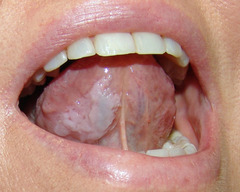
Leukoplakia

answer
White patchy lesions
question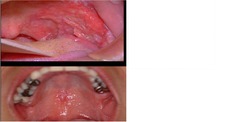
Erythroplakia

answer
Red velvety patches
question
Head and neck cancer first spreads to the
answer
Nearby structures -lymph nodes -muscle -bone
question
Later spread of head and neck cancer is
answer
systemic, to distant sites -usually the lungs or liver
question
Carcinoma in situ is an
answer
earlier stage of the cancer - well differentiated - prognosis is good
question
Most head and neck cancers arise from the _____ _____ and _____.
answer
Mucus membrane Skin *they can also start from salivary glands, the thyroid, or other structures*
question
What are the two most important risk factors for head and neck cancer?
answer
Alcohol and Tobacco use *especially in combination*
question
Additional risk factors for head and neck cancers.....
answer
Voice abuse Chronic laryngitis Exposure to chemicals and dust Poor oral hygiene Additional risk factors *long term GERD and HPV*
question
Head and Neck Cancer Assessment findings
answer
Patient may have difficulty speaking because of *hoarseness, shortness of breath, tumor bulk and pain* - Pace the interview to avoid tiring the patient
question
Head and Neck Cancer History - What to ask?
answer
tobacco and alcohol use? hx of acute or chronic laryngitis or pharyngitis? oral sores and lumps in the neck? chronic lung disease? *Use matter of fact approach during the interview to make the patient more comfortable*
question
What is the earliest form of laryngeal cancer?
answer
Vocal chord lesions
question
People with laryngeal cancer may have ________ hoarseness.
answer
Painless because of tumor size and inability for vocal cords to come together for normal speech
question
A person with a hx of hoarseness, mouth sores, or a lump in the neck for 3-4 weeks should be evaluated for
answer
Laryngeal cancer
question
Diagnostics - Labs
answer
CBC Bleeding times (could be impaired from liver damage -alcohol abuse) Urinalysis - Kidney function BMP - kidney function, electrolytes, nutrition CMP - Liver function Protein/Albumin - Nutrition status
question
Diagnostics - imaging
answer
X-Ray - cancer spread, tumor invasion, other tumors CT - Evaluate tumors exact location MRI - differentiates normal from diseased tissue Bone Scans/SPECT/PET - help locate additional tumor sites
question
Other DX assessments - *Panendoscopy*
answer
Laryngoscopy, Nasopharyngoscopy, Esophagoscopy, and Bronchoscopy all performed at one time under *general anesthesia* - to define the extent of the tumor
question
Tumor Mapping Biopsies
answer
To identify tumor location Biopsy tissues are taken at the time of panendoscopy to confirm the dx and determine the tumor type, cell features and location
question
Tumor Staging is done by the
answer
TNM method Tumor, Node, Metastasis
question
Without treatment, head and neck cancers grow to the point of
answer
airway obstruction
question
Airway obstruction can occur as a result of
answer
treatment
question
Preventing Respiratory Obstruction What position should the patient use for best air exchange?
answer
Fowlers or Semi-Fowlers
question
Radiation for treatmet of *small cancers in specific locations* has a cure rate of at least
answer
80%
question
Standard radiation treatment is usually (course of treatment)
answer
1-2x/day for 6 weeks
question
Radiation therapy would be performed (before/after) surgery....
answer
After Radiation therapy slows tissue healing, so it would be performed after surgery
question
Most patients have what symptoms for several weeks after radiation therapy?
answer
Hoarseness Dysphagia Skin problems Dry Mouth
question
Hoarseness following radiation - teaching
answer
-Reassure that the voice will improve within 4-6 weeks -Teach voice rest and alternative means of communicating until the effects of radiation have passed
question
Sore Throat and Difficulty Swallowing after radiation - TEACHING
answer
Gargling with saline or sucking ice to decrease discomfort Mouthwashes and throat sprays containing a local anesthetic (lidocaine or diphenhydramine) Analgesic drugs *mouthwash should NOT contain alcohol*
question
The skin at the site of irradiation becomes red and tender and may peel during therapy - *Teach* the patient
answer
-Avoid exposing this area to sun, heat, cold, and abrasive treatments (shaving) -Wear protective clothing made of soft cotton -Wash the area with *mild* soap (Dove) -Follow oncology's department policy regarding the use of skin care products
question
*Xerostomia* - Radiation can cause dry mouth if the salivary glands are in the irradiation path - This can cause the following problems
answer
Increased risk for dental caries Increased risk for oral infections Halitosis Taste changes
question
Xerostomia - *Teach*
answer
Flouride gel trays and treatments at night - reduce tooth deterioration Heavy fluid intake - particularly water Humidifying the air Artificial Saliva (Salivart) Moisturizing gels or sprays *Saliva Stimulants* - Salagen and cevimeline
question
Chemoradiaton
answer
Chemotherapy and radiation are sometimes used at the same time *oral cavity effects of radiation are intensified with concurrent radiation*
question
Most chemotherapy regimens for Head and Neck cancer include what drug?
answer
Cisplatin
question
Because if the intensified oral cavity side effects that occur from chemoradiation, some patients request
answer
Breaks in the treatment regimen
question
Chemoradiation - breaks in the treatment regimen should be
answer
Avoided - a process called *No SToPS* Breaks *do* affect the outcome of the treatment
question
What intervention is implemented before chemoradiation to improve adherence to the treatment?
answer
Intense patient education before, and support during treatment
question
Biotherapy *Epidermal Growth Factor Receptor Blockers* (EGFR)
answer
*Cetuximab* For patients whose cancers overexpress the receptor *This drug blocks epidermal growth factor receptors in normal tissues as well as in the tumor - Severe Skin Reactions are common*
question
Surgical Procedures for Head and Neck Cancers
answer
Laryngectomy (total and partial) Tracheotomy Oropharyngeal Cancer Resections
question
Surgical Procedures for Laryngeal Cancer
answer
Cord Stripping Removal of a vocal cord *cordectomy* Partial laryngectomy Total laryngectomy *Nodal Neck dissection* if cancer is in the lymph nodes
question
Preoperative Care - *TEACHING*
answer
Teach about the tumor Explain self management of the airway ---> Suctioning, pain control methods, critical care environment (ventilators and critical care routines) Teach nutritional support - may include feeding tubes Help patient *learn new methods of communicating* - and to practice the use of the selected form of communication before surgery
question
What two surgical procedures will provide partial preservation of the patients voice?
answer
Hemilaryngectomy (vertical or horizontal) Supraglottic laryngectomy
question
Voice conservation procedures are used *only if*
answer
they do not risk incomplete removal of the tumor
question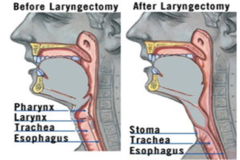
Total Laryngectomy

answer
The upper airway is separated from the throat and the esophagus, the trachea is brought out through the skin in the neck and sutured in place creating a stoma.
question
Neck Dissection includes removal of what?
answer
Lymph nodes Sternocleidomastoid muscle Jugular Vein 11th Cranial nerve (Spinal Accessory Nerve)
question
What can occur as a result of neck dissection - particularly the removal of cranial nerve 11?
answer
Shoulder drop *Physical therapy can help the patient ease the shoulder drop by using other muscle groups*
question
What surgical procedures will for Laryngeal cancer will leave the patients voice *Normal/hoarse*?
answer
Laser Surgery Transoral cordectomy Supraglottic partial laryngectomy
question
What surgical procedures will for Laryngeal cancer will leave the patients voice *Normal*?
answer
Laryngofissure
question
What surgical procedures will for Laryngeal cancer will leave the patients voice *Hoarse*?
answer
Hemilaryngectomy Vertical Laryngectomy
question
What surgical procedures will for Laryngeal cancer will leave the patients with *no natural voice*?
answer
Total laryngectomy
question
What are the *first priorities* after head and neck surgery?
answer
Airway maintenance and ventilation
question
Complications after surgery include:
answer
Airway obstruction Hemorrhage Wound breakdown Tumor recurrence
question
Immediately after surgery, most patients need
answer
Ventilatory assistance
question
During weaning from a ventilator after surgery the patient usually uses a
answer
tracheostomy collar (over the artificial airway or open stoma)
question
Oxygen and humidity are used with ventilation after surgery to
answer
-help move mucus secretions -humidity helps remove crusts and prevents obstruction of tube with secretions
question
Secretions after head and neck surgery may remain blood tinged for
answer
1 to 2 days *report any increase in bleeding to the surgeon*
question
A Laryngectomy tube is similar to a _________ tube but is ______ and _______ with a larger lumen. It is used for patients who have undergone a _______ ____________.
answer
Tracheostomy shorter and wider Total Laryngectomy
question
The purpose of a laryngectomy tube is
answer
to prevent scar tissue shrinkage of the skin-tracheal border
question
The laryngectomy tube can be changed how often?
answer
Daily or as needed
question
Laryngectomy button
answer
similar to tube --- softer, has a single lumen and is very short comfortable for the patient easily removed for cleaning available in various sizes and lengths for a custom fit
question
Airway maintenance - *teaching*
answer
instruct the patient how to cough and deep breath to clear secretions Oral secretions can be suctioned by the *alert* patient using a yankauer or tonsillar suction or soft red latex catheter *teach the patient to suction AWAY from the side of the surgery to prevent wound opening* - may provide a mirror
question
Tissue "flaps" may be used after surgery to
answer
close the wound and improve appearance They are skin, subcutaneous tissue and sometimes muscle taken from other body areas that may be used for reconstruction after head and neck resection.
question
Wound, Flap, Reconstructive Tissue Care
answer
*The first 24 hours after surgery are critical* Evaluate all grafts and flaps *hourly for the first 72 hours* Monitor capillary refill, color, drainage and Doppler activity of the major feeding vessel Position the patient so that the side of the head and neck with the flaps is *not dependent* *Report changes to the surgeon immediately!*
question
Hemorrhage is a possible complication after any surgery but it is
answer
uncommon after laryngectomy
question
Postop - neck drain
answer
to collect blood and drainage for about 72 hrs after surgery drain also helps maintain position of skin flaps obstruction or equipment malfunction may cause buildup of blood or serum under the flaps = impaired blood flow = flap failure and tissue loss A sudden stoppage of drainage may indicate a clot obstructing the drain - may need to "milk" the drain Monitor drainage - record amount and character
question
Hemorrhage may occur in patients with head and neck cancer post op because many of these patients have a history of
answer
alcohol abuse = liver damage = poor clotting
question
Postoperative Head and Neck Cancer Wound Breakdown
answer
A common complication caused by *poor nutrition, *long smoking history, alcohol use, wound contamination and previous radiation therapy*
question
Managing wound breakdown
answer
with packing and local care as prescribed to keep the wound clean and to *stimulate the growth of healthy granulation tissue*
question
Postop Head and Neck Cancer Wound Care - *Carotid Artery*
answer
The carotid artery may be exposed after surgery - split thickness skin grafts often are placed over the artery for protection. As the wound heals granulation tissue covers the artery and *prevents rupture* -if granulation is slow and the carotid artery is at risk, another surgical flap may be made to cover and close the wound
question
Postop Head and Neck Cancer It is also possible for the carotid artery to have a small ______ with continuous _______ of ______ ____ ______ . Usually, this leads to a complete ____________.
answer
leak oozing bright red blood rupture
question
Postop Head and Neck Cancer *Pain Management*
answer
*Morphine* by PCA for 1-2 days after surgery Liquid Opioid Analgesics *only after the patient can tolerate oral intake* After discharge - *Liquid NSAIDS* - can be used alone with opioid analgesics
question
Postop Head and Neck Cancer *Pain Management* - Amitriptyline
answer
Or other tricyclic antidepressants may be used for the lancinating pain of *nerve-root involvement*
question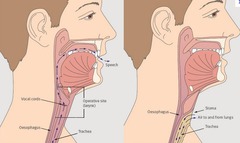
Can a patient aspirate after having a total laryngectomy?

answer
NO The airway and the esophagus have been completely separated
question
Postop Head and Neck Cancer Nutrition
answer
NG, Gastrostomy, or jejunostomy tube is place during surgery for nutritional support while the head and neck heal ~remains in place for 7-10 days ~before removing the tube *assess the patients ability to swallow if nutrition is to be given by mouth*
question
Postop Head and Neck Cancer Nutrition - Swallowing
answer
may be uncomfortable at first - analgesics may be needed
question
Postop Head and Neck Cancer Speech and Language Rehabilitation - voice and speech differences will depend on
answer
the type of surgical resection performed (Table 31-2)
question
What is a laryngectomee?
answer
A person who has had a laryngectomy
question
For voice rehabilitation to be successful for a patient who has had a laryngectomy, they will need
answer
encouragement and support from the SLP, hospital team, and family while relearning to speak. *Having a laryngectomee visit the patient and family is often beneficial*
question
What are common means of communication after having a laryngectomy?
answer
Esophageal speech Using a mechanical device Use of a tracheoesophageal puncture
question
Esophageal speech is produced by
answer
"burping" the air swallowed or injected into the esophageal pharynx and shaping the words in the mouth
question
With esophageal speech, the voice produced is (what does it sound like?)
answer
Monotone Cannot be raised Carries no pitch
question
Patients who do not have adequate hearing and use esophageal speech may need
answer
A hearing aid they need to use their mouth to shape the words as they hear them
question
A side effect some patients have from swallowing air during esophageal speech is
answer
Intestinal bloating *Treatment* - Antacids
question
One benefit of using esophageal speech is that it strengthens the
answer
respiratory and abdominal muscles, which aids in clearing secretions and in breathing
question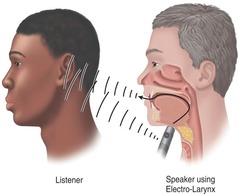
Electrolarynges are

answer
~mechanical devices used by the patient who cannot attain esophageal speech ~placed on side of the neck or the cheek ~air inside mouth or throat is vibrated - patient moves lips/tongue as usual
question
The Cooper Rand

answer
An external voice device that consists of a tube that is placed in the patients mouth and vibrates during speech. Robot-like unnatural sound is produced
question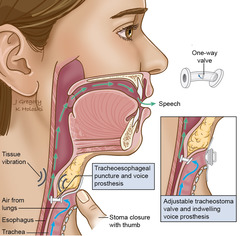
Transesophageal Puncture

answer
If esophageal speech is ineffective and if the patient meets *strict criteria* ~small surgical puncture created between the trachea and the esophagus using special catheter ~after the puncture heals --> silicone prosthesis inserted in place of the catheter ~patient covers stoma, or uses a valve that they open and close which diverts air from the lungs through the trachea, into the esophagus and out of the mouth ~ Lip and tongue movement produce speech
question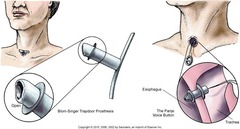
Two types of prosthesis used in a transesophageal puncture are

answer
Blom-singer prosthesis Panje Voice button
question
The patient who has had surgery for head and neck cancer is at increased risk for aspiration because of
answer
Surgical changes in the upper respiratory tract Altered swallowing mechanisms The presence of an NG tube
question
Prevent NG tube aspiration with the use of routine reflux precautions such as
answer
elevate the head of bed strictly adhere to tube feeding regimen *check residual volume before each bolus feeding and every 4-6 hrs on continuous feed*
question
Swallowing can be a _______ problem for a patient who has a _________ _____/
answer
Major Tracheostomy tube *sometimes the tube fixes the larynx in place, resulting in difficulty swallowing* Additionally - an inflated tracheostomy tube cuff can balloon backward and interfere with the passage of food.
question
A patient who has had a *partial vertical* or *supraglottic laryngectomy* MUST be observed for aspiration. *Teaching* alternate methods of swallowing such as the ______________ method is critical.
answer
"Supraglottic" method of swallowing
question
Reducing anxiety in the patient with head and neck cancer
answer
~Explore the reason for the anxiety (fear of the unknown, fear of pain, fear of airway compromise) ~Before the patient is scheduled for surgery - provide information - may be able to decrease fears about the disease process and surgical interventions ~ *Lorazepam* is preferred over other antianxiety drugs because of its shorter duration and decreased respiratory side effects
question
Supporting self concept in the patient with head and neck cancer
answer
~Help them set realistic goals ~Teach alternative communication methods ~Teach the family to ease the patient into a normal social environment ~Positive reinforcement, encouragement, acceptance and caring behaviors
question
After surgery the patient may feel socially isolated because of changes in their voice and/or facial appearance. What things can be done to help with this?
answer
~Loose fitting, high collar shirts or sweaters, scarves, and jewelry can be worn to cover a laryngectomy stoma, tracheostomy tube. ~Cosmetics may aid in covering disfigurement
question
Home care management for the patient after a laryngectomy include assessing the home for what particular things?
answer
~General cleanliness of the home ~Possible changes to allow for one-floor living ~Increasing humidity - either add on to a forced air furnace or using a room humidifier ~*If using room humidifier be sure to stress meticulous cleaning to prevent spread of mold or other sources of infection*
question
Teaching for self management - *Stoma Care*
answer
~Use a shower shield (prevent water from entering airway) ~Electric shavers - cover stoma while shaving to prevent hair from falling into it ~Stoma guard during the day ~Increase humidity in the home and stay well hydrated (prevents secretions from thickening) ~ Normal saline instillations if prescribed
question
Teaching for self management -*Communication*
answer
~Have the patient continue the method of communication that began in the hospital ~Instruct them to wear a *MedicAlert* bracelet and carry a special identification card --> instructs the reader about providing an emergency airway or resuscitating someone who has a stoma
question
Psychosocial Preparation - post laryngectomy
answer
~Schedule a visit from a person who has adjusted to the same changes ~Stress the importance of returning to as normal a lifestyle as possible ~Teach that they may need to be prepared for increased mucus secretions during laughing and crying and they should keep a handkerchief or gauze on hand to cover the stoma.
question
Health Care Resources for patient with laryngectomy
answer
American Cancer Society - can provide dressing materials and nutritional supplements to patients in need Local Laryngectomee clubs- support, information, friendships Visiting Nurse Agency - to help locate available resources when having trouble with paying for health care services.



